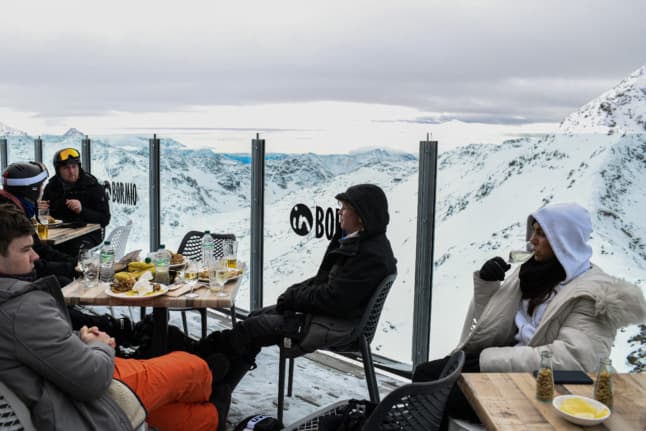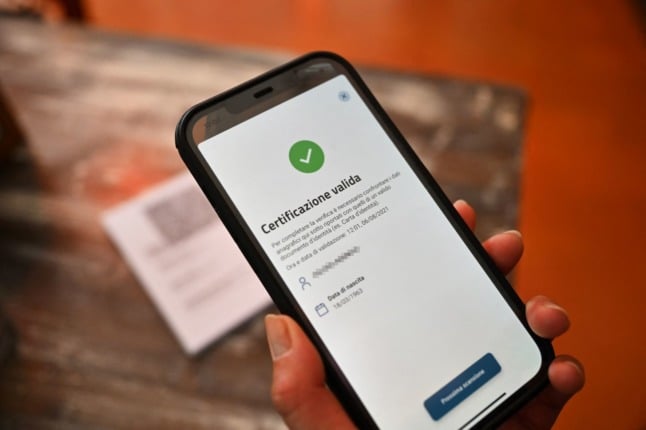EXPLAINED: Where you need Italy’s Covid vaccine pass from January 10th

Italy's Covid restrictions change once again from Monday January 10th. Here's what you need to know.
Italy extends its 'reinforced' or 'super' green pass requirement to a range of additional venues from Monday under a rule change announced in late December.
The reinforced green pass, first introduced in early December, can only be obtained via vaccination or recovery and not with a negative test result - leading some to refer to it as a vaccine pass.
Calendar: When do Italy’s Covid-19 rules change?
Since the pass was introduced, Italy has operated on a two-tier health certificate system, with the more longstanding basic green pass (which can be obtained by a negative test result, in addition to vaccination or recovery) required for some venues and activities, and the super green pass required for others.
As Italy's case numbers have spiked in recent weeks, the Italian government has expanded the use of the reinforced green pass in an effort to encourage vaccine uptake and curb its infection rates.
Here are all the venues to which the 'super green pass' requirement will be added from January 10th, according to the latest information on the government's website (here in Italian):
- All restaurants and bars, for both indoor and outdoor dining, including in hotels
- All public transport, including local buses
- School buses serving children aged 12 and up
- Hotels
- Ski lifts
- All indoor and outdoor swimming pools, wellness centres, gyms and team sports facilities, including changing rooms
- All indoor and outdoor spas and thermal baths except for “essential rehabilitation or therapeutic treatments”
- Museums, exhibitions and cultural venues, including libraries
- Celebrations relating to religious or civil ceremonies
- Fairs, festivals, conventions and conferences
- Theme parks
- Indoor and outdoor cultural, social and recreational centres (excluding educational centres for children)
- Games rooms, betting rooms, bingo halls and casinos.

From January 10th Italy’s reinforced green pass will be required to enter a range of additional venues. Andreas SOLARO / AFP
This is in addition to the venues where the super green pass is already required:
- Indoor theatres, cinemas and concert halls
- Sports stadiums and events
- Visits to residential and care homes (either a booster dose or a negative test is also required here)
Despite expectations that the government could announce an extension of the super green pass requirement to the workplace in its latest decree issued on Wednesday, no such development materialised.
The 'basic' green pass remains valid to enter the workplaces for all categories of workers not subject to a vaccine mandate (currently healthcare workers, police, teachers, university staff, and emergency services workers).
Instead, the decree took many by surprise in imposing a vaccine mandate for all over-50s in Italy.
EXPLAINED: What’s in Italy’s latest Covid decree?
Prime minister Mario Draghi said at a cabinet meeting on Wednesday that the government was “working in particular on the age groups that are most at risk of being hospitalised, to reduce pressure on hospital to save lives.”
An estimated 2.34 million people aged over 50 in Italy have yet to have a single dose, according to the latest data from the Gimbe Foundation, an independent research institute.
From January 10th, booster doses of anti-Covid-19 vaccines will be made available four months after the last dose, instead of five as is currently the case, Italy’s pandemic emergency commissioner has confirmed.
Comments (7)
See Also
Italy extends its 'reinforced' or 'super' green pass requirement to a range of additional venues from Monday under a rule change announced in late December.
The reinforced green pass, first introduced in early December, can only be obtained via vaccination or recovery and not with a negative test result - leading some to refer to it as a vaccine pass.
Calendar: When do Italy’s Covid-19 rules change?
Since the pass was introduced, Italy has operated on a two-tier health certificate system, with the more longstanding basic green pass (which can be obtained by a negative test result, in addition to vaccination or recovery) required for some venues and activities, and the super green pass required for others.
As Italy's case numbers have spiked in recent weeks, the Italian government has expanded the use of the reinforced green pass in an effort to encourage vaccine uptake and curb its infection rates.
Here are all the venues to which the 'super green pass' requirement will be added from January 10th, according to the latest information on the government's website (here in Italian):
- All restaurants and bars, for both indoor and outdoor dining, including in hotels
- All public transport, including local buses
- School buses serving children aged 12 and up
- Hotels
- Ski lifts
- All indoor and outdoor swimming pools, wellness centres, gyms and team sports facilities, including changing rooms
- All indoor and outdoor spas and thermal baths except for “essential rehabilitation or therapeutic treatments”
- Museums, exhibitions and cultural venues, including libraries
- Celebrations relating to religious or civil ceremonies
- Fairs, festivals, conventions and conferences
- Theme parks
- Indoor and outdoor cultural, social and recreational centres (excluding educational centres for children)
- Games rooms, betting rooms, bingo halls and casinos.

This is in addition to the venues where the super green pass is already required:
- Indoor theatres, cinemas and concert halls
- Sports stadiums and events
- Visits to residential and care homes (either a booster dose or a negative test is also required here)
Despite expectations that the government could announce an extension of the super green pass requirement to the workplace in its latest decree issued on Wednesday, no such development materialised.
The 'basic' green pass remains valid to enter the workplaces for all categories of workers not subject to a vaccine mandate (currently healthcare workers, police, teachers, university staff, and emergency services workers).
Instead, the decree took many by surprise in imposing a vaccine mandate for all over-50s in Italy.
EXPLAINED: What’s in Italy’s latest Covid decree?
Prime minister Mario Draghi said at a cabinet meeting on Wednesday that the government was “working in particular on the age groups that are most at risk of being hospitalised, to reduce pressure on hospital to save lives.”
An estimated 2.34 million people aged over 50 in Italy have yet to have a single dose, according to the latest data from the Gimbe Foundation, an independent research institute.
From January 10th, booster doses of anti-Covid-19 vaccines will be made available four months after the last dose, instead of five as is currently the case, Italy’s pandemic emergency commissioner has confirmed.
Join the conversation in our comments section below. Share your own views and experience and if you have a question or suggestion for our journalists then email us at [email protected].
Please keep comments civil, constructive and on topic – and make sure to read our terms of use before getting involved.
Please log in here to leave a comment.